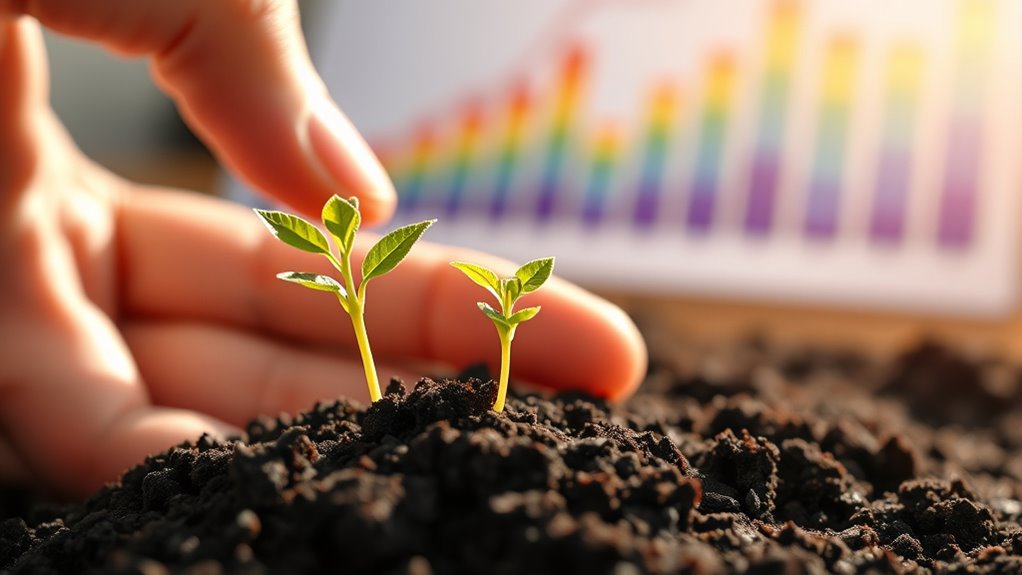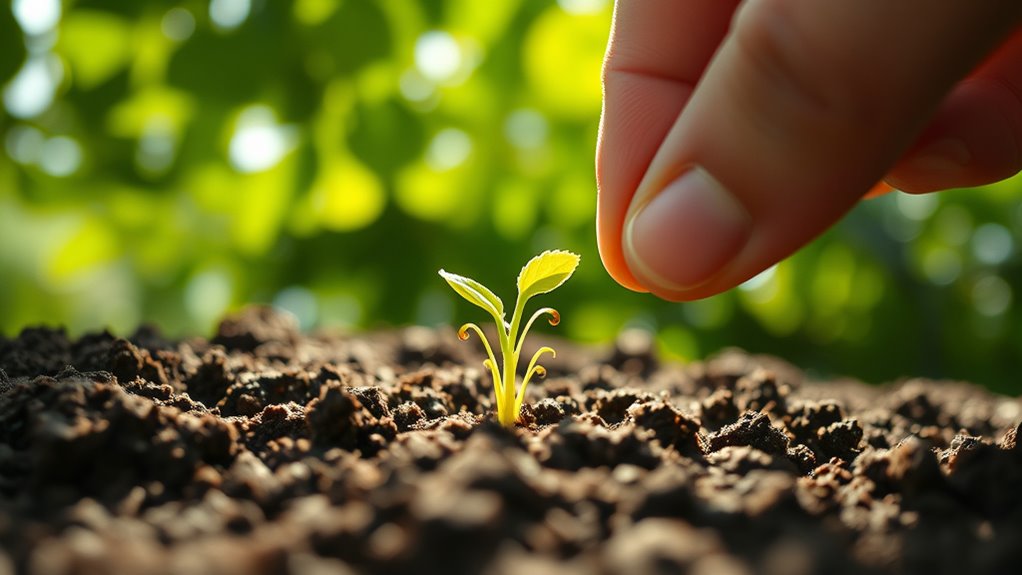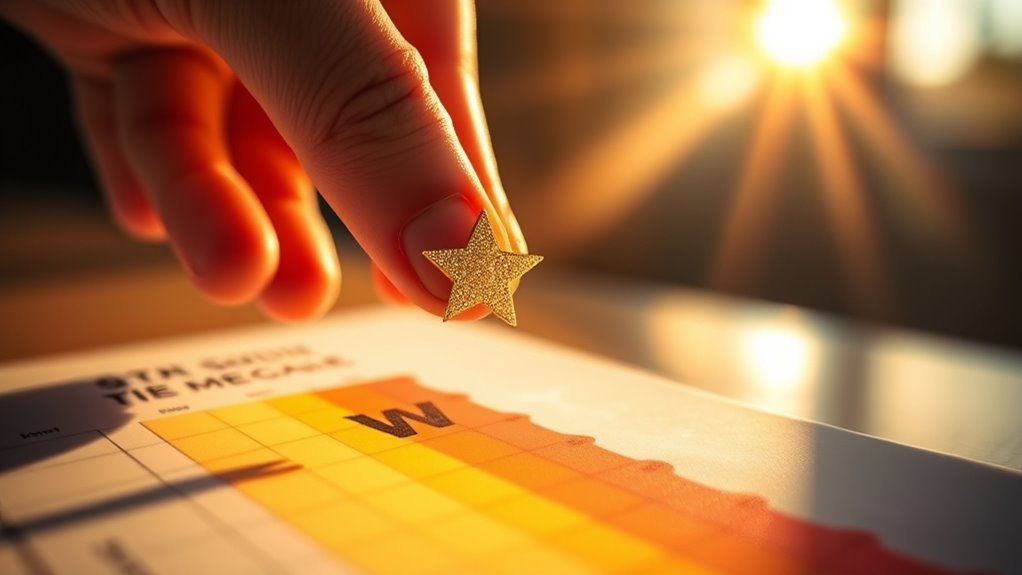When you celebrate small wins, your brain’s reward system releases dopamine, boosting motivation and feelings of success. This reinforcement strengthens neural pathways linked to positive behaviors, making it easier to build habits and stay resilient. Recognizing progress also triggers neural adaptation, reinforcing confidence and reducing stress. By consciously celebrating these moments, you activate mechanisms that support growth and persistence. Keep exploring how these neurological benefits can power your habits and mindset even further.
Key Takeaways
- Celebrating small wins activates the brain’s reward system, releasing dopamine that reinforces positive behaviors and motivates repetition.
- Dopamine surges from successes strengthen neural pathways, making habits more automatic and approach behaviors more confident.
- Recognizing achievements triggers neural adaptation, reinforcing neural connections linked to success and enhancing neuroplasticity.
- Positive emotions from small wins lower cortisol levels, reducing stress and increasing emotional resilience.
- Celebrations reinforce neural circuits associated with confidence and persistence, supporting habit formation and a growth mindset.
The Brain’s Reward System and Small Successes

Since small successes trigger your brain’s reward system, recognizing these wins can boost motivation and reinforce positive habits. When you celebrate even minor achievements, you activate your brain’s reward pathway, encouraging feelings of pleasure and accomplishment. This process promotes neuroplasticity enhancement, making it easier for your brain to form new, beneficial habits. Each small victory sends a signal that your efforts are paying off, strengthening neural connections associated with success. Over time, these repeated activations help rewire your brain, making goal-oriented behaviors more automatic and satisfying. Additionally, adaptive learning technologies can personalize this process by tracking your progress and highlighting areas of achievement. By intentionally acknowledging small wins, you tap into your brain’s natural reward system, creating a positive feedback loop that sustains your motivation and encourages continued progress. This simple habit leverages your brain’s wiring to support long-term growth.
Dopamine’s Role in Motivation and Reinforcement

Dopamine plays an essential role in fueling motivation and reinforcing behaviors by signaling pleasure and anticipation in your brain. When you achieve a small win, dopamine levels spike, creating a sense of reward anticipation that drives you to keep going. This reinforcement encourages you to repeat the behavior, making progress feel rewarding. Over time, your brain undergoes neural adaptation, which can reduce dopamine responses to familiar stimuli, potentially decreasing motivation. That’s why celebrating small wins resets your brain’s reward system, boosting dopamine release and reigniting your drive. Additionally, understanding the power of small wins can help you build momentum and sustain motivation over the long term. By understanding dopamine’s role, you can intentionally create moments of success that reinforce positive habits. This process helps sustain motivation, making it easier to stay committed and enjoy your journey toward larger goals.
How Celebrations Trigger Neural Pathways

Celebrations activate specific neural pathways in your brain that strengthen positive behaviors. When you engage in celebratory rituals, your brain responds by reinforcing the connection between success and reward. These rituals create a pattern of neural adaptation, making it easier to repeat the behavior in the future. By consistently celebrating small wins, you help solidify these pathways, encouraging a habit of recognizing progress. The brain associates these joyful moments with achievement, increasing motivation and reinforcing the behavior. Over time, this neural reinforcement makes celebrating a natural response, fueling your drive to continue succeeding. Essentially, celebratory rituals serve as powerful tools to shape your brain’s wiring, embedding positive habits through their influence on neural pathways. Additionally, incorporating wall organization systems can visually reinforce a sense of achievement and order, further supporting positive habits.
The Impact of Positive Feedback on Brain Plasticity

When you receive positive feedback, your brain strengthens the neural pathways associated with those actions, making it easier to repeat them. This boost also increases dopamine levels, creating feelings of reward and motivation. Over time, these effects encourage greater brain flexibility, helping you adapt and learn more effectively. Additionally, engaging in consistent positive reinforcement can promote neuroplasticity, enhancing your overall ability to develop new skills and habits.
Reinforces Neural Pathways
Positive feedback plays a crucial role in strengthening neural pathways, making it easier for your brain to repeat successful behaviors. When you receive positive reinforcement, your brain enhances neural efficiency by solidifying the connections involved in those actions. This process encourages synaptic pruning, where weaker or unused connections are eliminated, sharpening the pathways that support your skill or habit. As a result, your brain becomes more efficient at executing these behaviors with less effort over time. Each small win reinforces the neural circuits responsible for your progress, creating a positive feedback loop that promotes learning and growth. By consistently celebrating your achievements, you help your brain optimize its wiring, making future success more automatic and effortless. Additionally, understanding the diverse genres of anime films can inspire your brain to form new neural connections through exposure to different storytelling styles.
Boosts Dopamine Levels
Boosting dopamine levels is a key way positive feedback enhances brain plasticity. When you celebrate small wins, your brain anticipates future rewards, increasing dopamine release. This surge not only reinforces your motivation but also improves emotional regulation, helping you stay focused and resilient. As dopamine floods your system, it signals that you’re progressing, making it easier to maintain positive habits. The anticipation of reward energizes your brain’s reward pathways, encouraging you to keep pushing forward. This process strengthens neural connections related to achievement and satisfaction. By regularly experiencing these dopamine boosts through small wins, you reinforce a cycle of motivation and emotional balance. This positive feedback loop ultimately makes your brain more adaptable, ready to learn, and open to new challenges. Additionally, understanding personality traits can help tailor strategies to maximize your motivation and resilience.
Encourages Brain Flexibility
Celebrating small wins actively encourages brain flexibility by promoting the growth of new neural connections. This process enhances neuroplasticity, allowing your brain to adapt more easily to new challenges. When you acknowledge progress, your brain becomes more receptive to learning and change. To deepen this effect: neuroplasticity, which is influenced by various factors including positive reinforcement, can be further supported through consistent practice and environmental enrichment.
- Reinforces positive pathways, making habits easier to establish.
- Stimulates the formation of new synapses, boosting neuroplasticity enhancement.
- Encourages cognitive flexibility, enabling you to shift perspectives effortlessly.
- Builds resilience by strengthening adaptive thinking skills.
Small Wins and the Development of a Growth Mindset

Celebrating small wins helps strengthen your neural pathways, making it easier to learn and improve over time. When you succeed, dopamine releases, boosting your motivation and encouraging you to keep going. These wins also build your confidence, reinforcing a growth mindset that thrives on progress rather than perfection. Additionally, recognizing achievements can promote emotional resilience, helping you better handle setbacks and challenges.
Neural Pathway Strengthening
When you recognize small wins, your brain begins to form stronger neural pathways associated with growth and achievement. This process leverages neural plasticity, allowing your brain to adapt and rewire itself. Each success triggers synaptic growth, reinforcing the connections between neurons involved in positive behaviors. Over time, these strengthened pathways make it easier to approach challenges confidently. Recognizing these accomplishments also fosters a sense of self-efficacy, encouraging continued effort and persistence.
Dopamine and Motivation
Recognizing small wins triggers the release of dopamine in your brain, which plays a crucial role in fueling motivation and reinforcing positive behaviors. This process enhances neuroplasticity, making it easier for your brain to adapt and learn from new experiences. When you celebrate even minor achievements, you activate the brain’s reward circuit, creating a positive feedback loop that encourages continued effort. The dopamine released during these moments not only boosts your mood but also strengthens neural pathways associated with growth and persistence. Over time, this neuroplasticity enhancement helps you develop a growth mindset, where challenges are viewed as opportunities rather than setbacks. Additionally, understanding the importance of emotional distance can help maintain a balanced perspective on setbacks and achievements. By consistently acknowledging small wins, you reinforce your motivation, making it easier to stay committed to your goals.
Confidence Building Effects
Have you noticed how small wins can boost your confidence and reshape your mindset? They trigger positive neurological responses, reinforcing your belief in growth. Here’s how they build confidence:
- They create a sense of accomplishment, fueling motivation.
- Practicing mindfulness meditation helps you stay present and appreciate progress.
- Social support amplifies these effects, offering encouragement and validation.
- Repeated small successes develop a growth mindset, making challenges seem manageable.
Neurological Effects of Recognizing Progress

Acknowledging small wins triggers a cascade of positive neurological responses that reinforce your motivation and perseverance. When you recognize progress, your brain undergoes neural adaptation, making it easier to repeat the behaviors that led to success. This process involves synaptic strengthening, where connections between neurons become more efficient as they fire together more frequently. As a result, your brain becomes wired to associate effort with reward, boosting your confidence and encouraging continued effort. Celebrating small wins activates the reward centers in your brain, releasing feel-good chemicals like dopamine. Over time, these neurological changes solidify your habits, making it easier to stay committed. Recognizing progress therefore not only fuels your motivation but also rewires your brain for sustained success.
The Connection Between Celebrations and Stress Reduction

When you celebrate small wins, your brain releases dopamine, which helps ease stress and boosts your mood. These positive emotions also lower cortisol levels, making you feel more relaxed. Recognizing progress regularly can be a simple yet powerful way to reduce stress over time.
Dopamine Boosts Stress Relief
Ever wondered why celebrating even small wins can make you feel better? When you engage in celebration rituals or gratitude practices, your brain releases dopamine, a feel-good neurotransmitter. This spike not only enhances your mood but also reduces stress levels. Here’s how it works:
- Reinforces positive behavior, encouraging more success.
- Creates a sense of achievement, easing anxiety.
- Stimulates pleasure centers, uplifting your mood.
- Builds resilience by shifting focus from stress to celebration.
Positive Emotions Lower Cortisol
Celebrating small wins triggers positive emotions that directly influence your body’s stress response. When you feel joy or pride, your brain chemistry shifts, reducing cortisol levels that cause stress. This boost in emotional resilience helps you handle challenges more effectively. By intentionally celebrating, you reinforce neural pathways associated with positive feelings, making stress management easier over time.
| Celebration Effect | Stress Reduction Benefit |
|---|---|
| Boosts positive emotions | Lowers cortisol levels |
| Enhances brain chemistry | Strengthens emotional resilience |
| Reinforces neural pathways | Promotes mental clarity |
| Improves overall well-being | Supports long-term health |
Focusing on small wins creates a feedback loop that nurtures your emotional resilience, helping you stay calmer during tough times.
Reinforcing Habits Through Dopamine Release

Reinforcing habits often hinges on the brain’s natural reward system, particularly the release of dopamine. When you complete a small task or achieve a goal, dopamine surges, reinforcing the behavior and strengthening neural pathways. This process is vital for habit formation, as it encourages you to repeat actions that produce positive feelings. Over time, repeated dopamine releases lead to neural adaptation, making behaviors more automatic. To harness this, consider these points:
- Celebrate small wins to trigger dopamine spikes.
- Consistency enhances neural adaptation for lasting habits.
- Positive reinforcement strengthens neural pathways.
- Understanding this process helps you stay motivated long-term.
Building Confidence Through Neural Activation

Building confidence often begins with activating specific neural pathways in your brain. Engaging in mindfulness exercises helps you focus on the present moment, reducing self-doubt and reinforcing positive neural connections. When you practice mindfulness regularly, you strengthen pathways associated with calmness and clarity, making it easier to approach challenges confidently. Goal visualization is another powerful tool; by vividly imagining successful outcomes, you activate neural circuits linked to motivation and self-assurance. This mental rehearsal primes your brain to believe in your capabilities, boosting confidence over time. Combining mindfulness with goal visualization creates a feedback loop that reinforces your belief in yourself. As these neural pathways become stronger, you’ll find it easier to take on new tasks and face obstacles with greater resilience.
Practical Strategies to Leverage Neurological Benefits

To effectively leverage the neurological benefits of your efforts, start by incorporating daily habits that reinforce positive neural pathways. Practicing mindfulness meditation can sharpen focus, reduce stress, and strengthen neural connections related to emotional regulation. Additionally, applying principles from nutritional neuroscience—such as consuming omega-3s and antioxidants—supports brain plasticity and resilience. Here are four practical strategies:
- Commit to 10 minutes of mindfulness meditation daily to enhance neural plasticity.
- Incorporate brain-boosting foods rich in omega-3s and antioxidants into your diet.
- Set small, achievable goals to stimulate dopamine release and reinforce progress.
- Regularly reflect on your wins to solidify positive neural associations and motivation.
These habits help your brain adapt, grow stronger, and maximize the neurological benefits of celebrating small wins.
Frequently Asked Questions
How Quickly Does the Brain Respond to Small Successes?
When you celebrate small wins, your brain responds quickly, often within minutes. This rapid neuroplasticity adaptation is driven by dopamine release, which rewards your efforts and encourages continued progress. The brain’s ability to adapt and reinforce positive behaviors happens swiftly, helping you stay motivated. By recognizing even tiny successes, you activate this process, making it easier to build momentum and develop lasting habits through consistent reinforcement.
Can Celebrating Small Wins Improve Long-Term Goal Achievement?
Celebrating small wins can considerably boost your motivation and confidence. Research shows that acknowledging progress triggers dopamine release, acting as a motivation booster. By doing so, you reinforce positive behavior, making it easier to stay committed to long-term goals. Celebrations serve as confidence builders, helping you see tangible progress and stay inspired. So, embracing small victories regularly keeps you motivated and enhances your chances of achieving your bigger aspirations.
Are There Specific Brain Regions Involved in Recognizing Progress?
When you recognize progress, your brain activates specific regions like the reward circuits, including the nucleus accumbens and ventral tegmental area. These neural pathways respond to positive feedback, reinforcing your motivation. By acknowledging your small wins, you engage these areas, which strengthen the neural connections associated with achievement. This process boosts your drive to reach long-term goals, making it easier to stay committed and persistent.
How Does Individual Brain Chemistry Influence Celebration Effectiveness?
Think of your brain as a garden; individual chemistry determines how brightly it blooms. Your unique neurotransmitter impact influences how your brain reward pathways respond to celebration. When you acknowledge small wins, these pathways release feel-good chemicals, reinforcing positive habits. If your chemistry is highly responsive, celebrating feels more effective, motivating you further. Conversely, less responsiveness might mean you need different approaches to boost motivation and recognize progress.
What Are the Potential Downsides of Over-Celebrating Small Wins?
When you over-celebrate small wins, you risk falling into overconfidence pitfalls, which can make you underestimate challenges or overestimate your abilities, leading to setbacks. Additionally, excessive celebration may cause motivation burnout, where the initial enthusiasm fades, making it harder to stay consistent. It’s important to find a balance—celebrate enough to boost morale but not so much that it hampers your progress or creates unrealistic expectations.
Conclusion
So, next time you celebrate a small win, remember you’re actually wiring your brain for success—literally. It’s funny how something as simple as a high-five or a pat on the back can boost dopamine and build confidence. Ironically, by celebrating tiny victories, you set yourself up for bigger ones. So go ahead, indulge in those little celebrations—they’re secretly your brain’s favorite trick for growth and resilience. Who knew success was just a happy brain away?









